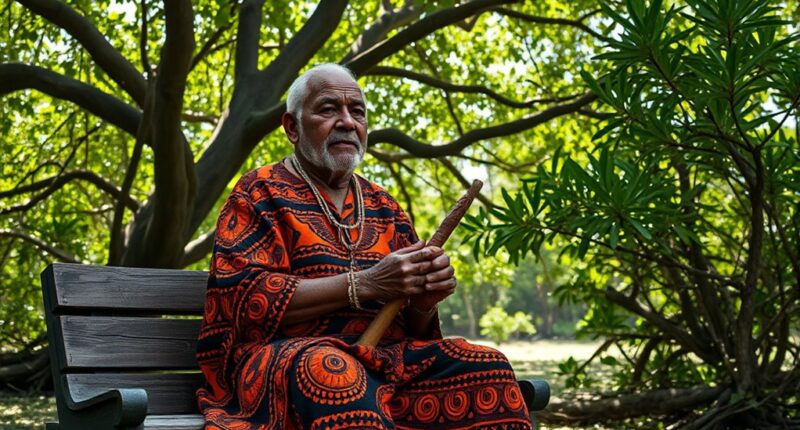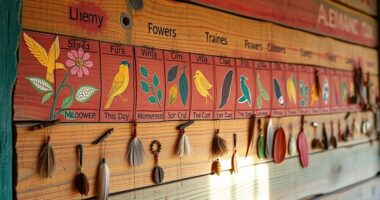The Tiwi language’s unique grammar features intricate verb conjugations and noun classifications that encode relationships, spatial ideas, and social hierarchy. Its grammar allows speakers to express nuanced concepts reflecting their worldview. The complex verb system and noun structures set Tiwi apart from other languages and are essential for maintaining its cultural authenticity. If you continue exploring, you’ll discover how these grammatical features embody the rich traditions and resilience of the Tiwi people.
Key Takeaways
- Tiwi grammar features complex verb conjugations that encode social relationships and spatial concepts.
- It includes intricate noun classifications reflecting community hierarchy and environmental features.
- Verb systems allow expression of nuanced ideas, moods, and social meanings.
- Grammatical structures embody the community’s worldview and cultural identity.
- Preservation efforts focus on maintaining these unique grammatical features through community-led initiatives.

Have you ever wondered how indigenous languages like Tiwi survive in today’s world? The Tiwi language, spoken by the Tiwi people on the Tiwi Islands off the northern coast of Australia, has a rich history that spans thousands of years. Its origins trace back to early Aboriginal communities, with unique features that set it apart from other Australian languages. Despite the widespread influence of English and other dominant languages, the Tiwi language remains an essential part of the community’s identity. Over the years, efforts to preserve the Tiwi language have become increasingly important, especially as younger generations face increasing exposure to outside cultures. The history of the Tiwi language is marked by resilience, with community-led initiatives working tirelessly to keep it alive amid modern challenges. These include language documentation projects, bilingual education programs, and cultural festivals that celebrate Tiwi traditions.
The resilient Tiwi language thrives through community efforts, cultural pride, and modern preservation initiatives.
When it comes to Tiwi language preservation, you’ll notice that the community’s actions are driven by a deep pride in their heritage. Many elders serve as custodians of the language, passing down stories, songs, and oral traditions that encode the community’s history and worldview. These efforts are essential because they help maintain the language’s unique grammar, vocabulary, and pronunciation. The Tiwi language’s grammar itself is notably intricate, featuring a complex system of verb conjugations and noun classifications that reflect relationships, spatial concepts, and social hierarchy. This grammatical structure isn’t just a linguistic feature; it embodies the community’s way of understanding the world around them. Preserving this grammar is indispensable to keeping the language authentic and vibrant. Additionally, the language’s complex verb system plays a crucial role in expressing nuanced ideas and social relationships, making it vital for linguistic preservation.
Community initiatives have also embraced technology, creating digital archives, mobile apps, and online resources for learning Tiwi. These tools make it easier for younger generations to connect with their roots, ensuring the language’s continuity. Schools on the islands incorporate Tiwi into their curriculum, teaching children their ancestral language alongside English. By doing so, they foster a sense of pride and belonging that motivates ongoing language preservation efforts. Although challenges remain—such as urban migration and the dominance of English—the community’s commitment to their language continues to grow stronger.
In essence, the survival of the Tiwi language depends on a collective effort rooted in cultural pride. With each story shared, word learned, and tradition upheld, the Tiwi language’s history and grammar are passed on, strengthening the community’s identity. Your awareness of these preservation efforts underscores how essential it is to support indigenous languages worldwide. The Tiwi language isn’t just a means of communication; it’s a living testament to a community’s resilience, history, and unique worldview. Through ongoing dedication, it can thrive for generations to come, ensuring that the rich tapestry of Tiwi culture remains vibrant and enduring.
Frequently Asked Questions
How Many Speakers Currently Use the Tiwi Language Daily?
You might find that around 1,000 people still use the Tiwi language daily, especially within local communities. To support language revitalization, community engagement plays a crucial role, encouraging elders to pass on their knowledge and younger generations to embrace their heritage. By actively participating in these efforts, you help preserve the language’s unique grammar and cultural significance, ensuring it remains a essential part of daily life on the Tiwi Islands.
What Efforts Are Being Made to Preserve the Tiwi Language?
You can support linguistic revitalization and cultural preservation efforts by participating in programs that teach the Tiwi language in schools and community events. Local organizations work to document traditional stories and practices, ensuring they’re passed down to future generations. By learning and speaking Tiwi, you help keep this unique language alive, fostering cultural pride and protecting the Tiwi Islands’ rich heritage for generations to come.
Are There Any Dialects Within the Tiwi Language?
Yes, there are dialectal variations within the Tiwi language, reflecting its rich linguistic diversity. You’ll notice differences in pronunciation, vocabulary, and some grammatical features across various Tiwi communities. These dialects help preserve local cultural identities and showcase the language’s complexity. Recognizing and studying these variations is essential for understanding the full scope of Tiwi’s linguistic diversity, which can inform preservation efforts and promote cultural pride among Tiwi speakers.
How Has Contact With English Influenced Tiwi Vocabulary?
English has sprinkled Tiwi vocabulary like seeds on fertile ground, transforming it with English loanwords. You’ll notice bilingual code switching becoming a common dance, where speakers switch seamlessly between Tiwi and English. This influence enriches the language, making it more adaptable and vibrant. You might find familiar words from English woven into daily conversations, showing how contact with English has left a lasting mark on Tiwi vocabulary.
Is Tiwi Used in Local Education and Media?
You’ll find that Tiwi language plays a crucial role in local education and media, helping preserve its cultural significance. Schools incorporate language revitalization programs, encouraging students to learn and speak Tiwi. Media outlets, including radio and community events, actively promote its use, fostering pride and continuity. By supporting these efforts, you help keep the Tiwi language alive and strengthen the community’s cultural identity for future generations.
Conclusion
Now that you’ve explored the Tiwi language’s unique grammar, you see how it’s truly a treasure chest of cultural richness. Its distinct structure reveals a world where every word and rule tells a story of the Tiwi people’s history and identity. Just like a needle in a haystack, understanding this language might be tricky, but it’s worth the effort. Embracing such diversity reminds us that sometimes, you have to look beyond the surface to find the real treasure.









